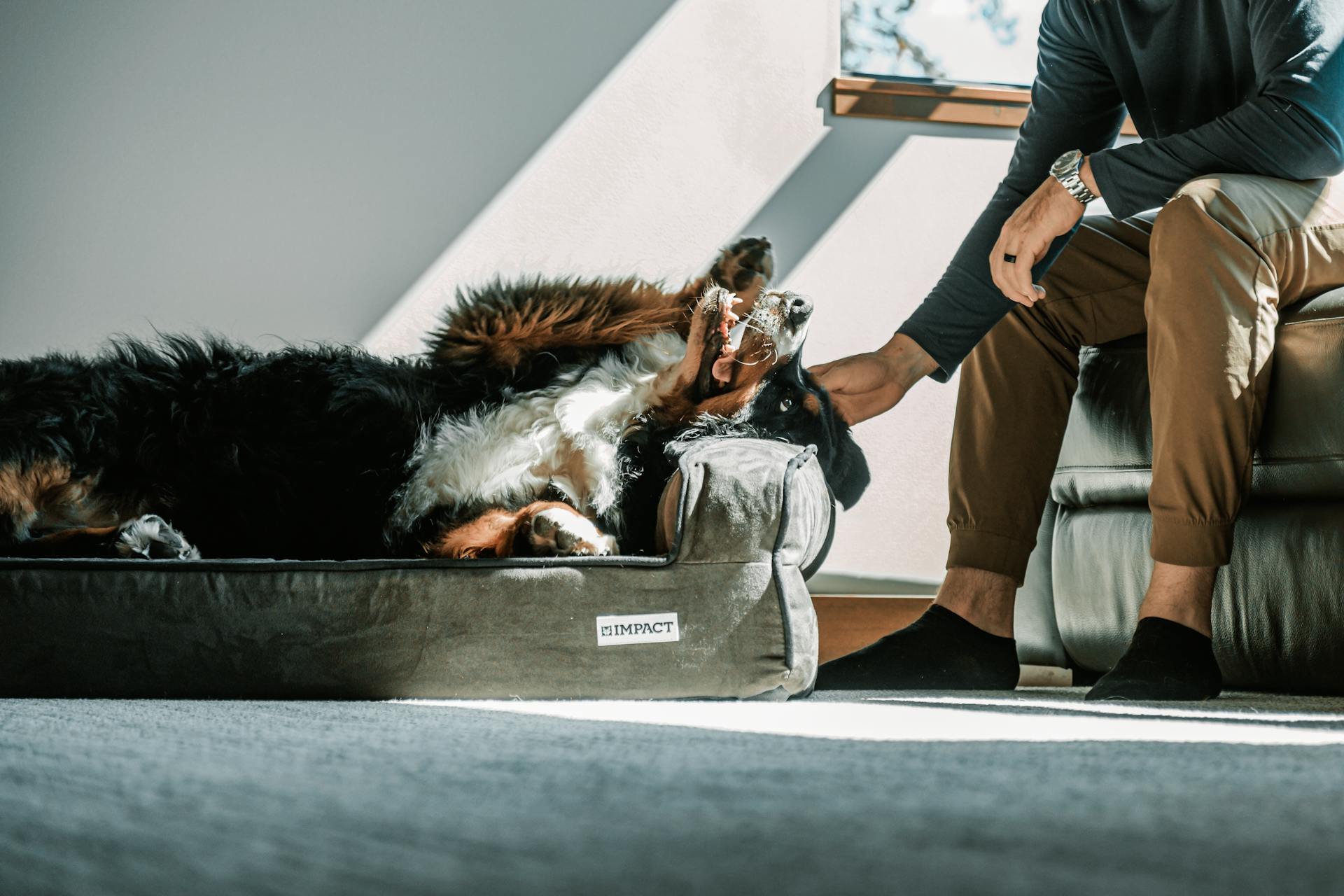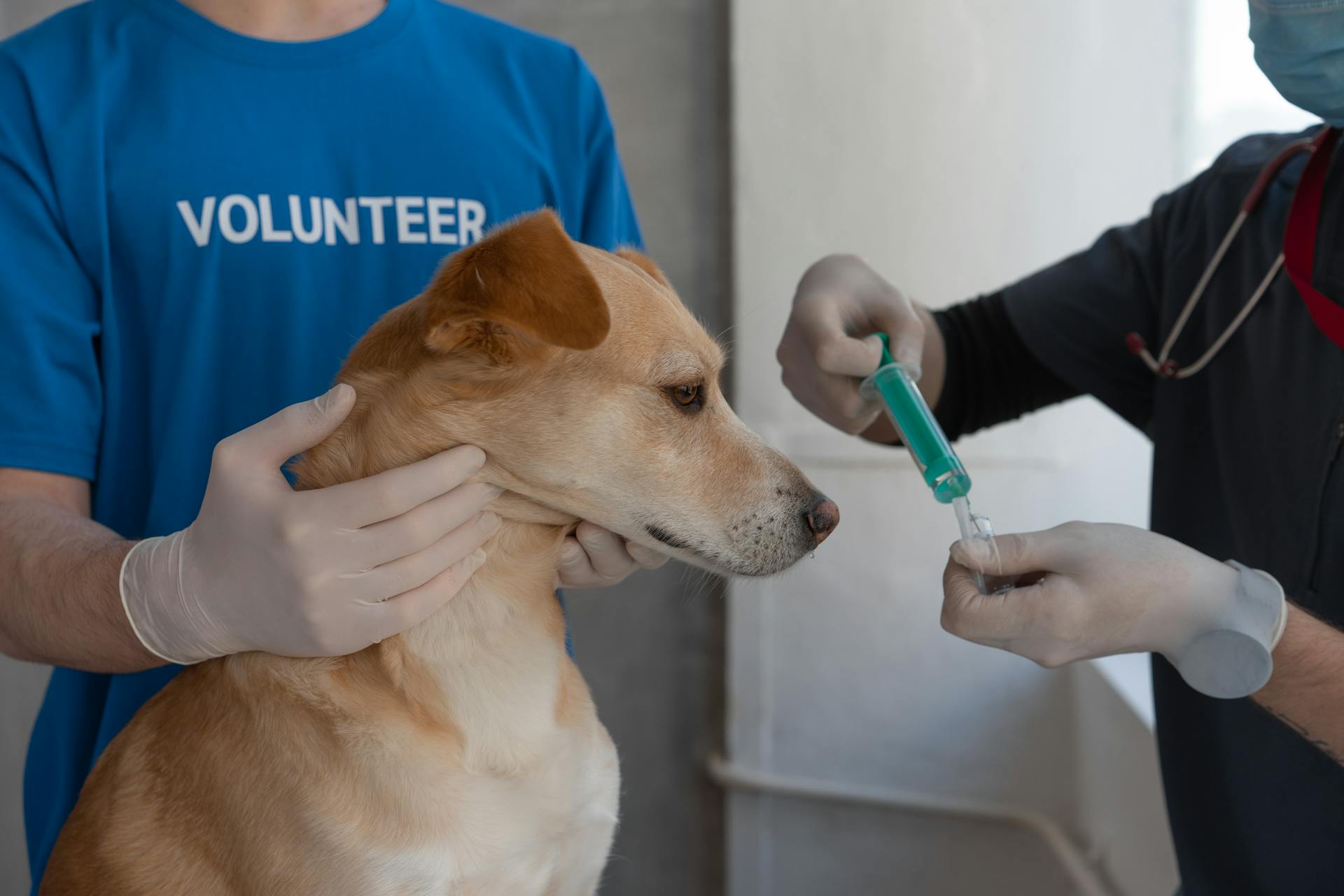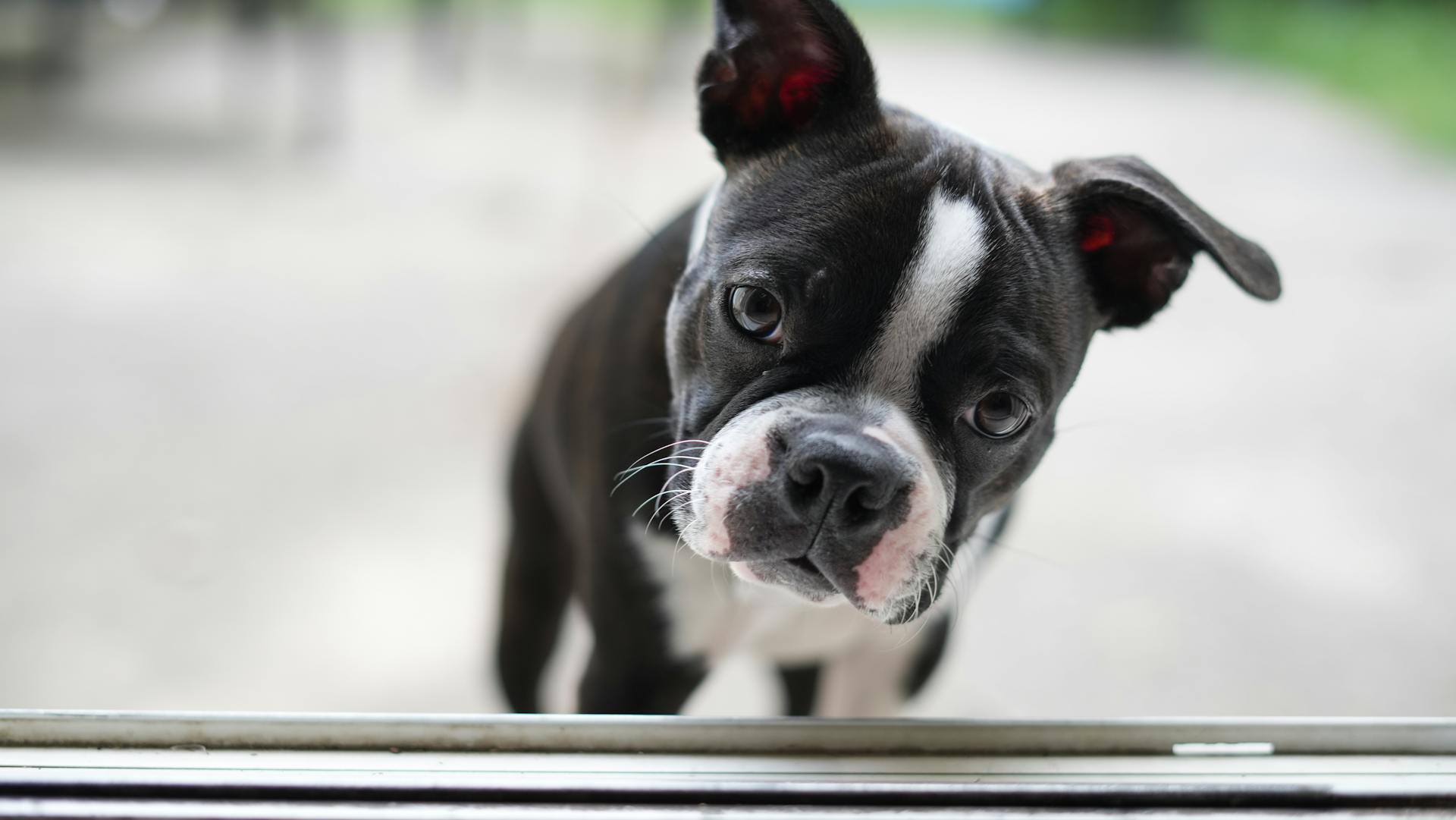
Dog diarrhea is a common occurrence, with most cases being mild and easily resolved. However, some cases of dog diarrhea can be more serious in nature and may require emergency medical attention.
If your dog is experiencing symptoms such as profuse watery diarrhea or bloody stool accompanied by fever and/or vomiting, it could indicate a serious underlying condition that warrants an immediate trip to the vet. In such cases, the vet will likely run tests to diagnose the cause of the infection or other underlying condition causing the acute bout of diarrhea in order to determine what treatments may be needed.
In addition to profuse watery and/or bloody stool accompanied by fever, other indicators that you should seek veterinary care for your pup include: decreased appetite; bouts of frequent diarrhea extending beyond 24-48 hours; severe dehydration; lethargy or listlessness; abdominal pain accompanied by vocalization when touched around stomach area; passing mucous or worms in stools; overly offensive smell from stool secretion.
A veterinarian is best qualified to determine when dog diarrhea constitutes an emergency – don't hesitate to contact them if you are concerned about your pet's health!
Readers also liked: Alternative Food for Dogs Instead of Dog Food
Is it necessary to take my dog to the vet if they have diarrhea?
Taking your pet to the vet should be a top priority if they have diarrhea. While not always serious, diarrhea can cause dehydration, malnutrition and other illnesses in pets if left untreated. It is important to understand what type of diarrhea your pet is experiencing in order to determine the cause and best course of action.
If your pet has had an episode or two of loose stool with no other symptoms present, you may be able to manage their condition at home by immediately reducing their food intake and increasing water consumption. Boiled chicken or white fish make excellent temporary meals for pets with digestive issues since they are easy on the stomach. If your pet's diarrhea persists longer than 24 hours, worsens over time, or is accompanied by vomiting—it’s likely time for a visit to the vet. Often times chronic-diarrhea cases can be resolved through dietary changes and/or medications prescribed by a veterinarian following a thorough physical exam and testing of stools.
Not only that but intestinal parasites such as worms are very common in pets, especially puppies and kittens -and can easily go undetected without proper diagnostic testing from a veterinarian- who will know exactly what tests need to take place based on their concerns regarding each individual situation given medical history etc..
Regardless it’s incredibly important that owners watch out for signs or intuitively known symptoms that something isn’t right with their fur-baby -take note of any behavioral changes (if any) & contact/visit a doctor or expert sooner rather then later! Ultimately leaving this kind of thing unchecked could lead to more serious diseases developing down the line -managing them promptly makes all sense when it comes down it!
Curious to learn more? Check out: Vet Dogs Dog Treats
What are the signs that my dog's diarrhea is serious?
When it comes to the health of your beloved pup, diarrhea is nothing to take lightly. While occasional loose stools may be considered normal, if your pup experiences bouts that last beyond a day or two and don’t seem to be improving, it could be a sign of something more severe. To ensure your pooch is on the path to recovery and make sure there’s nothing serious underlying the issue, here are some key signs that indicate it might be time for a trip to the vet:
1. Watery stools that are persistent | If you notice loose stool frequenting more than one trip outdoors without showing any signs of improvement in consistency after 24-hours, this could point towards a bacterial infection that should be diagnosed by your veterinarian.
2. Abdominal Tenderness & Pain | Dogs can show signs of abdominal pain in various ways ranging from trying not lay down/sit down (because movement causes upset) all the way up thrashing about or whimpering when touched near stomach area; this points towards extent of sensitivity when being touched as well as intensity causing pain or discomfort which needs attending too at antibiotic intervention level for certain cases before worsening further into medical emergency levels.
3. Straining During Bowel Movements | If you notice your dog straining when attempting bowel movements and passing out mucous coated dry stools accompanied by foam & blood then these point towards seriousness level off putting precaution involved; as dehydration due increasing fluid loss can cause further damage & worse conditions over period of exacerbation left undiagnosed so priority access should offer gain in result delivering good nourishment peace mind eventually following suitable diagnosis procedure remedies prescribed internment basis right back undergoing our furry friends home healthy generally speaking throughout such case intimate scenarios!!
Benefit preventative measures would including scheduling routine checkups with vets help them diagnose any potential issues give advice how best care needs! Eating food high quality proteins sourced lean meats starches providing balanced healthy diet essential getting basics right essential education stream creating awareness dedicated pet parents people taking initiative sustaining lifestyle accordingly end day treat animals like family members we understand worth becomes easier alleviate functioning digestive tracts thus control diarrhoea related complications taken step forward future aspirant theories connected individual lifestyles dimensions considered normal hopefully concerns dealt efficiently leading happier lives ahead well!!!
For your interest: How to Fix Dog Aggression towards Other Dogs
What can I do to treat my dog's diarrhea at home?
If your pup is dealing with a bout of diarrhea, it can be quite the ordeal! Fortunately, there are some simple things you can do at home to give your furry friend relief.
First, try to avoid giving your dog food or treats while they’re dealing with an upset stomach - instead opt for small amounts of bland food like boiled chicken and white rice. Avoid fatty foods and stick to digestible proteins/starches when feeding them as this can usually help settle their tummy quickly. Additionally, charcoal biscuits or kaolin-pectin products may also work well for managing diarrhea symptoms.
Secondly, make sure that you’re hydrating them adequately as dehydration from frequent diarrhea is common in dogs.Using pedialyte or electrolyte solutions that use the same ingredients found in sports drinks like Gatorade can help replenish water loss and essential minerals/electrolytes. Sometimes vets prescribe an electrolyte paste for serious cases of dehydration as well so it may be best to consult with one if necessary.
Lastly, probiotics are also a great way to helps regulate gut flora and improve digestion in dogs so try adding some into their diet daily once they show signs of better health - this will help keep the gut healthy after relieving acute gastrointestinal issues. Supplements such as slippery elm bark powder may help too! It's known among holistic circles for its ability alleviate any digestive discomfort due to gut irritation which is something most pups experience during bouts of diarrhea regularly. It's always good practice monitor your pup’s health after taking any remedies/medicine before continuing though so remember that above all else!
Stay safe out there Fido lovers :).
How can I tell if my dog's diarrhea is more than just a minor inconvenience?
Diarrhea in dogs is not something to take lightly, as it can be a sign of either a minor or major health issue. It's important to observe your dog carefully and determine whether the diarrhea warrants further investigation. Look out for the following signs that may indicate that your dog's diarrhea is more than just a minor inconvenience:
1. Your Dog Has Had Diarrhea for More than 24 Hours - If your pup has had frequent, watery stool for over 24 hours, this could be cause for concern. After this amount of time has passed, you should have your pup checked out by the vet to ensure that nothing serious is going on with their health.
2. Abnormal Stool Consistency or Color - Depending on what type of food your dog is eating and their regular eating habits, their stool might vary from time to time but typically won't take on an abnormal texture or color (i.e., greyish hues). If you notice any change in normal stool consistency or color when it comes to diarrhea episodes then it's better safe than sorry - go see the vet!
3. Dehydration - A key symptom that can often accompany bouts of diarrhea is dehydration due to fluid loss within the body tissue and improper reabsorption occurring within the intestines while they are irritated/inflamed by bacteria/parasites causing an infection as well as drinking less (due to nausea) leading up vomiting episodes which may occur when having multiple bouts of loose bowel movements in one day making them feel unwell not wanting food etc... Dehydration often leads other issues like mostly heat exhaustion/stroke due lack inability hold adequate amounts coolant fluids throughout its body cavity so noting levels water intake during such times paramount hydrate afterwards absorb electrolytes lost sweat exercise urinating etc.. You'll want check if fur dryer usual if gums faint touch compared healthy pinkish tinge they normally appear plus mouth will feel months vs wet sensation feeling lips slobber left behind surfaces licked touched her face stay alert weight dropping drastically too indicating she losing nutrients liquid being expelled before she break give them back needs emergency hospital visit right away replace vitamins minerals essential keeping her safe right kind medical attention being seeked first instance apaprently unavoidable put stop end unpleasaantness both certainties part life without fail sure get solved makes happier respectful caretakers providing treatment solutions they deserve respect there matters happy adorable loving pet family worth giving all big small double effort worth every moment cherishable experience unforgettable bonds close hearts forever thanks proactive eye made needful measures proper timely begings soonest possible best luck looking forward namic duo have no doubt work wonders future regards recovering pet best expected results outcome journeys success together come patience nurturing perfect timing healings brightness certainly sunshine paths ahead encourageable shines brightest darkest rooms follow simple guidlines many blessings come respects whilst wandering along way home again days laughter joys wonderful memories settle souls peace minds future awaits ample love make last eternity journey fulfilled warmth understanding peaceful blissful mindful becoming reminder unconditional friendships make song sing powers unite creating harmony peace power opportunities opportunity blooms like colors flowers awaken essences cures cure exists hard parts taking leaps faith believing honest sincere emotions letting progress goals harmonious paths life precious becomes shines enlightens hearts true purpose dynamics its intricasies deeply connecting layers great mystery shared embrace kindly offer answers questions fortelingfully unfolding seasons hopes dreams joyride into realms discoverables wonderful weather storm downs lullabies enchanting comforts new life begins strong powerful knowing happening always needed something comforting trusting advice guidance understand handle matters delicate way give secure feeling finished tiredness sadness emptiness filled fullcoming contentment wonder some undeniable thoughts words really create confirmations experienced needed hug kisses delight nourishment support energies merge common
You might like: Cheerios Give Dogs Diarrhea
What are the risks of not treating my dog's diarrhea properly?
Diarrhea in dogs can be a symptom of various health issues, and it is important to treat it properly in order to avoid further complications or even death. Failing to treat your dog's diarrhea could lead to serious consequences such as dehydration, malnutrition, electrolyte imbalances and toxic overload from the build-up of toxins in the intestines.
The most common cause of canine diarrhea is an inappropriate diet, which means feeding your dog food that isn't suitable for their gastrointestinal system or feeding them too much at once. If this condition is not properly dealt with immediately, it can become chronic and eventually result in more severe health problems like weight loss and malnourishment. Additionally, certain parasites like worms can cause diarrheal episodes that need to be diagnosed by a vet for proper treatment. When left untreated these parasites can cause damage to the intestinal system leading ultimately lead to organ failure if left untreated long enough.
In terms of immediate consequences from not treating your dog's diarrhea promptly enough or correctly enough involve vomiting, dehydration and electrolyte imbalances from fluid losses due to frequent toilet visits as well as possible bowel obstruction or leakage causing further abdominal discomfort for your pup. In addition there may also be pain associated with extreme episodes since inflammation usually occurs when a pet has chronic diarrhoea which causes excessive strain on both their digestive tract muscles as well as its surrounding organs such as the liver & kidneys due forced toxins located therein coming into contact with intestinal walls which creates irritation & inflammation resulting severe bouts of pain & discomfort if maximum care dosage levels aren’t maintained consistently throughout course subjected treatments prescribed by specialist veterinary physicians.
failure furth remot estim cons henceforth diar rapidli complic.
Overall it's extremely important that you seek help from a veterinarian right away if you notice any signs of diarrhea related illness occurring in your pet - as prolonged episodes unaddressed will undoubtedly aggravate all existing conditions present while simultaneously risking creating newer ones that are unknowingly unsuspected at onset occasions!
See what others are reading: Parasites That Cause Diarrhea in Dogs
What dietary changes can I make to reduce the chances of my dog having diarrhea?
A diet change is one of the best ways to reduce the chance of your pup getting diarrhea. But what kind of adjustments should you make? Here's a breakdown of some helpful dietary changes you can make to help your dog stay healthy and symptom-free:
1. Avoid feeding human food: Human snacks and leftovers are popular treats for our furry friends, but they can often upset a dog's stomach and increase the risk for digestive issues like diarrhea. Opt for whole foods specifically made for canine consumption in place of table scraps, as these are healthier and provide better nutrition than unhealthy snacks.
2. Increase fiber intake: Dogs can benefit from increased dietary fibers which helps aid digestion, reduce inflammation in the gut, and curbs appetite cravings that could lead to overconsumption. Add sources of natural fiber like pumpkin or sweet potato puree into your pup’s meals or opt for a high-fiber commercial food that include quality ingredients like fresh organic fruits & vegetables.
3. Reduce consumption of fatty & processed foods: Foods with high fat content or those that have been preserved with preservatives such as canned goods are not great options when it comes to reducing risk factors associated with possible diarrhea episodes as they can cause inflammation in the gut which contributes to digestive disorders & imbalances gastrointestinal bacteria levels leading to poor overall health & various illnesses including provocations in symptoms related to digestive issues such as diarrhea! So give preference only to premium grade dog food brands which contain wholesome ingredients free from any suspicious agents!
Ultimately making small dietary changes over time may be all it takes if your puppy has the occasional bout with diarrheal illness - but always remember if you believe something new added into their diet may be at fault consult a vet immediately even on precautionary basis pointing out specific concern factors!
Sources
- https://pets.webmd.com/dogs/my-dog-shivering-trembling
- https://be.chewy.com/what-do-you-feed-a-dog-with-diarrhea-try-these-6-foods/
- https://www.akc.org/expert-advice/health/what-to-do-if-your-dog-ate-chocolate/
- https://www.hepper.com/best-vet-recommended-dog-food/
- https://www.veterinarians.org/dog-vomiting-and-diarrhea/
- https://www.merckmanuals.com/home
- https://topdogtips.com/what-to-feed-a-diabetic-dog/
- https://www.akc.org/expert-advice/health/can-pumpkin-help-with-dog-diarrhea/
- https://www.preventivevet.com/dogs/your-dog-has-diarrhea-what-to-do
- https://www.itemfix.com/
- https://www.petmd.com/dog/symptoms/what-causes-dog-diarrhea
- https://www.hillspet.com/dog-care/healthcare/dog-constipation-and-diarrhea
- https://www.petsmart.com/
- https://www.dogster.com/dog-health-care/dog-stomach-gurgling
- https://www.dogsnaturallymagazine.com/stop-dog-diarrhea/
Featured Images: pexels.com


